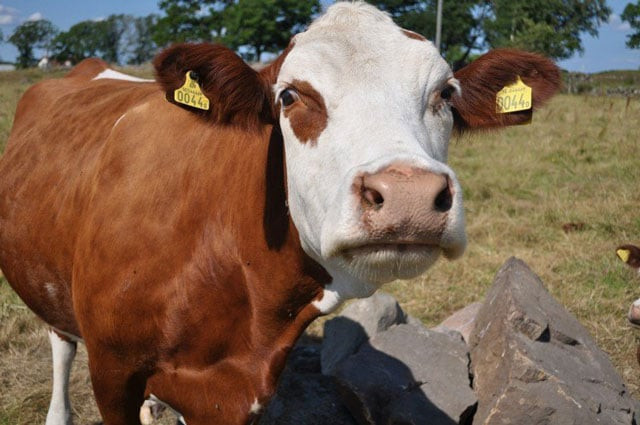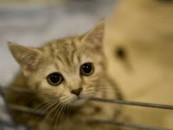Pakistani entrepreneurs help farmers get more milk out of their cattle
Cowlar’s tracking wearable for cows, buffaloes helps farmers increase milk yields by up to 15 per cent

PHOTO: TECH IN ASIA
Despite these rosy numbers, average milk yields per cow are abysmally low – estimated at only four to five litres per day during the lactation cycle. This pales in comparison to the United States – incidentally the world’s highest milk producing country – where cows yield on average 32 litres per day.
Chili Chutney takes Pakistani cuisine to a whole new level
The reason behind low yields boils down to primitive agricultural practices. Farmers rely on techniques that are several decades-old, and the concept of large, monitored dairy farms is almost non-existent. They also fail to utilize technology, which is commonly done in the West.
That’s the problem Cowlar wishes to solve. The startup makes a tracking wearable for cows and buffaloes that helps farmers increase milk yields by up to 15 per cent, it claims.

“In Pakistan and other developing markets farmers often fail to detect when their cows are in heat,” explains Umer Adnan, co-founder of Cowlar. “Hence they can’t inseminate the cow in time and milk production goes down.”
Drink more milk
Cowlar’s wearable constantly monitors the temperature and behaviour of the animal through motion-sensing trackers. Umer claims it can determine when the cow is eating, sleeping, mating, and any other significant activity.
The data is then fed back into an algorithm which determines things like the health of the cow, its predicted heat cycle, and any irregularities in behaviour. “There’s no on switch [for the gizmo],” says Umer. “It instantly recognizes it is now installed on a cow.”
9 mouth-watering pictures of Pakistani desserts
The wearable itself is developed by e4 technologies, the startup’s parent company. Among other things, the company also develops products for wireless crop monitoring, energy optimization, and motion tracking for sports.
Umer’s background is in mechatronics and electrical engineering, while his co-founder is trained in robotics. He says the size of the global market opportunity is “approximately US$400 billion,” and they’re building solutions for both small-scale and advanced dairy farms.
Cowlar’s trials in Pakistan have been fairly successful. Umer says they’ve managed to increase milk yields between 8 and 14 per cent.
“Even if you increase the average yield by 5 per cent, it can add US$1 billion to Pakistan’s economy every year. I don’t anticipate that everyone will buy our product, but there’s a lot of scope for value addition,” says Umer.
Boon for farmers
Cowlar costs US$69 as well as a US$3 monthly subscription fee after the first three months. The product is still in beta, but Umer says they’ve sold about 1,000 devices so far. On average it can help small farmers earn up to US$500 extra each month per cow.
“The biggest thing we’re trying to capture is when a cow is in heat. If farmers miss the heat cycle then the next cycle comes after 21 days. If you miss that, you’re missing out on 21 days of milk production, which is valued at about US$400.”
Dreams of thunder for Pakistani seeking Formula 1 glory
Since most of the startup’s customers are poor, uneducated farmers, it doesn’t send them a fancy SaaS dashboard or inundate them with data. It analyses the behaviour itself and sends farmers text message alerts giving them recommendations on how to manage their cows.
These can include warnings that the cow is unwell and needs medicine, or that the heat cycle is scheduled to begin soon.
“Farmers don’t find the change instantly – this is about working with them and changing their behaviour,” explains Umer. “If they follow our advice they’ll see changes after a month or so.”
“We don’t insert any steroids in the cow,” he adds. For farmers, Umer explains, the biggest fear is that their cow might contract an illness and die. They’ve been very receptive to Cowlar’s product as it can help them determine signs and symptoms at an early stage.
However, Umer admits that it is not possible for them, at this stage, to determine the exact disease afflicting the animal. “We can tell you that the cow is not well, for example, by understanding that its hind legs are becoming weak and that it’s not standing in the proper position. But is the algorithm good enough to predict the exact cause? Not exactly, but we’re working on it.”
This Pakistani woman may change your mind about arranged marriages
For more tech-savvy clients, usually those who reside in cities and employ workers to manage their farms, the startup does provide an online dashboard. This gives owners specific data about the health of their cows, as well as an activity tracker. They are notified when text message alerts are sent to workers and whether any follow-up action was taken.
The startup has applied for three patents, and narrowly missed out on winning the Future Agro Challenge held earlier this month. It’s also been incubated at Blackbox.
Umer is very upbeat about the future of his company. He says he’s received significant interest from 10 markets, including Brazil, Mexico, Nigeria, and Ireland. The plan is to strengthen the product locally and then roll it out globally. “We’re obsessed with solving big problems,” he adds.
This article originally appeared on Tech in Asia.



















COMMENTS
Comments are moderated and generally will be posted if they are on-topic and not abusive.
For more information, please see our Comments FAQ